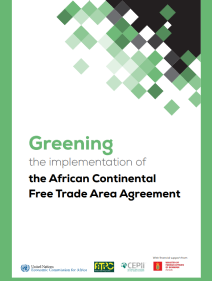The African Continental Free Trade Area (AfCFTA) Agreement aims to create a single market for goods and services, increase intra-Africa trade and promote sustainable socioeconomic development in Africa.
African countries need to balance efforts to address these goals with the urgency of climate change. As of the 27th session of the Conference of Parties of the United Nations Framework Convention on Climate Change in 2022, most African countries had submitted their Nationally Determined Contributions (NDCs) to mitigate the impact of climate change. Establishing a carbon market is now on the policy agenda.
This analysis uses a dynamic general equilibrium model with different sources of energy (including renewable energy) and an in-depth presentation of greenhouse gas emissions to assess the economic and environmental impacts of implementing the AfCFTA Agreement and adopting various climate policies in Africa, including those NDCs and the International Monetary Fund’s proposal of carbon price floors.
It shows that implementing the agreement and achieving Africa’s climate objectives are compatible. Continental coordination of emissions reduction among African countries proves most efficient for climate actionIl démontre que la mise en œuvre de l’accord et la réalisation des objectifs climatiques de l’Afrique sont compatibles. La coordination continentale de la réduction des émissions entre les pays africains s’avère la plus efficace pour l’action climatique.
infographics
Share this:
Release Date:
12 April, 2024
© United Nations Economic Commission for Africa

